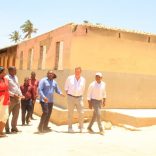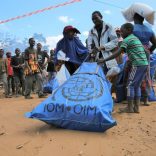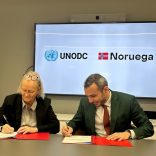Honorary consul of Mozambique in Munich pledges support for Namiteca school rehabilitation during ...
British historian Malyn Newitt calls for more studies on northern Mozambique

File photo: Mocímboa da Praia
A former professor of Portuguese and African studies at King’s College in London has pointed out that Mozambique is divided between north and south by the Zambezi River not only physically but also culturally.
British historian Malyn Newitt said on Wednesday that northern Mozambique deserved more study not only because of its economic potential but also to better understand a territory where problems have recently occurred.
“I still think that northern Mozambique is under-researched,” he said yesterday at the Royal Institute of International Relations, known as Chatham House, as part of a conference entitled “Democracy and Economic Inclusion in Mozambique: Understanding Prospects in the Context of the Past”.
@ChathamHouse conference on #Mozambique introduced by
HE Filipe Chidumo, High Commissioner of Mozambique,#CHAfrica @AfricaProg and launch of Malyn Newitt’s
A SHORT HISTORY OF MOZAMBIQUE @HurstPublishers https://t.co/z8yaedqJPy pic.twitter.com/G6hbMcN1qg— Michael Dwyer (@MikeDwyerMike) June 20, 2018
Author of more than 20 books on Portugal and the African colonies, Newitt recently published “A Short History of Mozambique,” which included observations on the region written in the late 19th century by British consul Henry O’Neill . “It’s clear that there are not as many sources as there are in other areas of Mozambique, but there are archaeological and written sources, and it’s important for politics and development,” he said.
Not only are expected economic developments expected in the north of the country, notably gas exploration, but the region has also been the scene of violent attacks since 2017 that have caused dozens of deaths.

The currently retired Newitt, who was vice-rector of the University of Exeter and a professor of Portuguese and African affairs at King’s College, says that the country is divided between north and south, largely by the Zambezi River.
On the other hand, he said, there is also a cultural difference between “the matrilineal and matrilocal system of the north and the patrilineal and patrilocal system of the south.”
In the opinion of the historian, the country is more fragmented at the regional and non-ethnic level, as is the case in other African countries. “Because the population of Mozambique has been so influenced by foreigners and has been so mobile, ethnic groups in Mozambique are especially difficult to establish and fluid. It is very difficult for many Mozambicans to say that they came from a unique historical ethos,” he added.
In the book “A Short History of Mozambique” presented yesterday, a Portuguese edition of which is not yet foreseen, Malyn Newitt invokes a concept he calls “African agency”, a kind of ingenuity that characterises the passive resistance that Africans have shown and which forced colonial authorities to change the way they acted in order to achieve local collaboration.
“Throughout history, the Africans of Mozambique have interacted with Indonesians, Indians, as well as Europeans and Portuguese and there has been a constant process of cultural exchange, producing new social formations, economic activity, linguistic changes and systems of faith,” he explains.
However, they have always adapted changes imposed on them to satisfy their own cultural systems, an emblematic example of which is the ‘prazo’ model of land granting practised in Mozambique by the Portuguese crown since the 17th century.
“All those who studied this topic emphasised how an institution supposedly part of Portuguese law and introduced by the Portuguese evolved in multiple ways to get closer to African social and cultural culture and the slaves of the ‘prazos’, the so-called ‘chicunda’ in an African logic of clans and domestic slavery,” he explains.












Leave a Reply
Be the First to Comment!
You must be logged in to post a comment.
You must be logged in to post a comment.